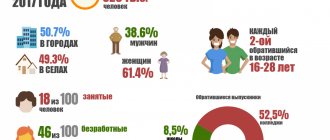Legal advice > Social security > Study from the employment center - training rules, payments, legal support
The authorities are trying to solve the problem of a high percentage of unemployment in different ways, using, along with vocational education, a retraining program. You can change your type of activity to a more popular option by contacting the employment center. A wide choice of areas makes it possible not only to acquire new knowledge, but also to receive government support at the stage of adaptation to a position.
Who does the employment center grant the right to free training?
With the help of studies from the employment center, you can not only learn a new profession, but also improve your skills.
Any unemployed citizen registered with the employment center can learn the basics of a new profession. The following prerequisites are considered reasons for participation in the educational program:
- the applicant lacks a specialty;
- inability to perform professional duties as a result of loss of qualifications;
- absence in the database of the exchange of vacancies corresponding to the qualifications of the unemployed.
The purpose of training is to acquire new knowledge with a view to implementing it in a new workplace.
The state program for providing studies from the employment center is designed for people of different ages who cannot apply their basic knowledge and experience in practice due to the lack of vacancies. If any applicant receives an order from an employer, he is trained individually, taking into account the specifics of the enterprise’s activities and job responsibilities. In other cases, courses are conducted in a group format.
Socially oriented program “learn for free!”
Graduating from college and university is often not enough to get a job. Many citizens are thinking about what free training courses are offered at the labor exchange in 2018 in order to improve their skills and become a sought-after specialist. Every person who does not have a job has the right to seek help from the nearest employment center and begin receiving appropriate benefits. If a citizen cannot be employed within a certain period of time, a specialist may offer to complete free courses in one of the areas. Main information A government agency, the employment service, is a multifunctional organization where you can not only find a job, but also improve your qualifications or gain new work skills. This service has a branch in every city in Russia.
Professions you can learn
As part of the program for retraining unemployed citizens, they can master any profession on the proposed list.
- nurse;
- accountant;
- storekeeper;
- security guard;
- hairdresser;
- telecommunications operator;
- lift operator, etc.
In addition, there are job vacancies that are in good demand among employers. Among the main ones:
- welder;
- installer;
- electrician;
- locksmith, etc.
Reference! Each territorial training center has an individual list for providing free training. This is due to a purely organizational basis and the issue of local funding.
What courses are available for the unemployed in Moscow?
Each region has an expanded list of professions offered for study. In Moscow, this list includes:
- construction and automotive crane operators;
- driver of municipal equipment, road construction vehicles;
- electricians, car mechanics, boiler service operators;
- installers of ventilation equipment, advertising structures;
- carpentry, welding, construction and finishing specialties;
- bakers, meat and food production workers;
- pastry chefs, waiters, bartenders, maids, sales area administrators;
- cashiers, salespeople, merchandisers;
- accountants of any areas, HR specialists;
- social workers, psychologists.
Classes are regularly organized for unemployed citizens in the form of online seminars, both full-time and remotely.
Citizens with medical education can undergo retraining in the following professions:
- paramedics;
- physiotherapists;
- junior medical staff;
- specialists in massage and physical therapy;
- laboratory technicians in X-ray rooms and diagnostic centers.
It is also possible to combine study and work, provided that the student fulfills all the requirements and manages to complete the educational professional program.
Nuances of admission
The range of areas in which you can take free courses depends on the region.
If there is no opportunity or desire to continue working in a previously acquired specialty, an option is to apply to the labor exchange. To receive financial support from the state and the possibility of free training, you must provide a package of documents.
The institution’s employees will check them, fill out the applicant’s registration papers, and offer a choice of available vacancies. If there is a need to improve qualifications or obtain them due to the lack of specialized education, then they provide a list of courses and draw up an agreement with the educational center for the training of the ward.
Training is carried out by teachers of educational centers, and not by employees of the employment service.
An agreement is concluded between a newly graduated student and the labor exchange based on an application for obtaining a qualification or retraining. The start date for classes is set immediately, or you must wait until the group is formed. The duration of the training course is from 1 month to six months.
What will the CZN courses teach?
Persons for whom no suitable job has been found in the Central Employment Center will be offered training courses to meet the available vacancies and the needs of society.
The list of professions that can be obtained is determined by the requests of employers in the current area or remote, as well as the list formed by the subject of the Russian Federation. For each subsequent year, such a list is compiled by regional authorities and is called something like this: “List of in-demand priority professions for organizing vocational training.”
Using the example of the city of Moscow and the plan for the past 2021, among other things, the following priority areas of training have been identified:
- crane operator;
- computer operator with knowledge of 1C;
- pastry chef;
- internet marketer;
- Web Designer;
- medical massage therapist;
- personnel management;
- 3D modeling;
- driver of vehicles;
- industrial climber;
- radiotelegraph operator;
- carpenter;
- car repair mechanic;
The list of priority areas of training for each region will be different, so you need to look for accurate information on the TsZN website or by visiting the service office - more often at the MFC.
Privileges
There is a separate category of citizens who have priority rights to study organized by the employment center. The preferential group includes:
- disabled people (regardless of group);
- parents or guardians with disabled children in the family;
- applicants who have not found a new job within six months;
- military personnel in reserve;
- graduates of specialized educational institutions who are employed for the first time;
- former conscripts discharged within three years.
Reference! Everyone who undergoes retraining under the employment service program is guaranteed a scholarship and a free medical examination.
During the period of training, applicants do not receive unemployment benefits; according to legislative acts, they are provided with a stipend. The amount of cash payments is decided on an individual basis, taking into account the period of job search and various life situations. Other financial assistance is also possible for low-income citizens who find themselves without a permanent source of income.
If the applicant falls ill during the training period, the payment of the scholarship does not stop, but subject to confirmation of the fact of illness by a certificate of temporary incapacity for work. The document must be certified by the signature and seal of the medical institution and intended for the territorial central health center in which the patient is registered.
Reference! The level of the scholarship may be reduced by a quarter or stopped being paid altogether if the student’s academic performance and class attendance leave much to be desired.
Legal documents define cases when the payment of the scholarship is completely terminated.
- Completion of the training course.
- Expulsion due to poor academic performance or misconduct.
- Completion of studies on personal initiative.
Financial support in the form of scholarships is not provided for women who leave their studies due to childbirth or maternity leave.
Preferential queue for taking CZN courses
According to Article 23 paragraph 3, there is priority for vocational training. After confirming the status of unemployed, these categories of people include:
- parents raising disabled children;
- school graduates;
- those who retired from military service, as well as their wives or husbands;
- completed military service within 3 years after dismissal;
- citizens who have not worked for 6 months;
- persons without qualifications, who have not previously worked, and those looking for work for the first time;
- those receiving social assistance under a social contract if there is a condition in it about completing training;
- spouses of civil servants assigned to another location;
- disabled people.
Thus, persons who require urgent selection of vacancies, who do not possess skills, or who have physical limitations can count on a preferential queue.
How to proceed
Manicure courses from the employment center.
The procedure for applying for free education is regulated by the employment law, which specifies the sequence of actions of the applicant.
- Contacting the employment service at your place of residence (registration).
- Submitting documents to the inspector or head of the center.
- Checking papers, registering the unemployed and registering him. Preparation of documents for payment of benefits (scholarships, other financial assistance).
- Drawing up a statement of desire to undergo free retraining. Concluding an agreement with the labor exchange on participation in the state program for obtaining a new specialty.
The list of required documents includes:
- passport;
- work book (if any);
- documents on basic and vocational education (certificate, certificate, diploma, etc.);
- applicant's statement;
- certificate of average earnings from the last place of work (for the last three months);
- document on an individual rehabilitation program (required from disabled people).
When an unemployed person re-applies to take a course under another program, it is necessary to provide an identity document, that is, a passport, and a certificate of the rehabilitation program if the applicant is disabled.
How the exchange can help
The powers of the labor exchange are to provide jobs to citizens. To fulfill the assigned duties, records are kept of graduates, employers, the unemployed, and the migration of specialists. The main task is to create a database of vacancies.
You can rely on the employment service if:
- There is no means for living and no opportunity to find a job, if you want to work.
- There is no professional orientation.
- Need help relocating to get a job.
- Need help completing training to get a job.
- It is necessary to clarify the rights, opportunities when searching for work, and other consultations.
- Helping graduates find work.
Those who apply to the CZN do not have privileges over other candidates for the position, including those who come directly to the employer without the mediation of the exchange.
The advantage is that employment authorities have complete information about vacancies, have access to the databases of other employment centers, follow the state plan for finding workers, and are able to refer them for free training. The employer is provided with support when attracting workers from other regions.
By the way, there is a common misconception that only outdated professions are offered on the exchange. Order of the Ministry of Labor No. 832 includes the following sectors:
- nanotechnology;
- aircraft manufacturing;
- Atomic industry;
- information Technology;
- electric power industry;
- machine production;
- chemical production.
These areas are actively developing and require new knowledge, fresh views and approaches.
How the training works
The process of obtaining qualifications is regulated by the internal regulations of the educational institution, which provides for exclusively full-time education. The applicant receives double support: from the employment service and the educational center.
Services
After registering with the employment center, you can count on the following assistance:
- assistance in finding a job;
- social adaptation;
- registration of benefits and additional payments;
- adaptation in a team, including psychological and professional support;
- opening your own business, increasing its competitiveness.
Types and forms of training
Cooking courses from the employment center.
Classes are conducted exclusively in person. The teacher provides information to a group of applicants or individually, which often occurs to prepare a specific candidate for a burning vacancy in the employment center database.
The type of training depends on basic knowledge and experience:
- preparation – involves mastering a new direction;
- advanced training – mastering additional knowledge based on the existing specialty;
- retraining – expanding knowledge in another field of activity.
The training is carried out according to a modular program, which allows the unemployed to obtain an in-demand profession in a short period of time. This is facilitated by the modern approach of educational workers who rely on students to independently master a large amount of material and present information in a playful way. Each topic and the training program as a whole are assessed through testing and examinations.
On average, the requalification process takes about three months.
Where and how do studies take place?
The educational process is conducted by teachers of educational centers who have entered into a partnership agreement with the employment service.
Applicants studying at an employment center have the right to combine retraining with paid public work. At the same time, the procedure for paying scholarships is not revised if the so-called student regularly attends courses and masters the taught material well.
The actions of employment center employees who send an applicant to study in another area are completely legal. In this case, the state assumes the following financial responsibility:
- compensation for travel on both sides of the route;
- daily expenses during the move;
- payment for housing during the period of study.
Reference! Upon completion of classes, the applicant is issued a document (certificate) confirming the acquired qualifications.
Training allowance
The process of obtaining a qualification or education is slow, so during this time students can receive a government scholarship. This is why an agreement is concluded. The amount of the scholarship depends on the social status of the citizen. The calculation is based on average earnings in the last 3 months of work:
- those who resigned in the general order, military - 75%;
- those who lost the ability to perform their previous work due to an industrial injury - 100%;
- citizens exposed to radiation - increased size. The exact amount depends on the status (liquidator, evacuated from the exclusion zone, etc.);
- those who have not previously worked - the minimum amount of unemployment benefits.
The scholarship from the employment center for the duration of your studies is paid from the first day after the start of the course. Deductions are made from such payments in favor of the state, just like from salaries.
It is important to remember that in case of irregular attendance or poor performance, the scholarship amount will be reduced by at least 25%. It is also possible to suspend payments for one month. It is also prohibited to stop studying without permission or violate the established schedule. In case of illness, you must provide a sick leave certificate, which will confirm a valid reason for absence from classes. Then the scholarship will not be deprived, as well as the opportunity to continue studying.
Important! If a citizen receiving a disability pension, as well as parents or guardians of disabled children, undergo training, they will not be deprived of the benefits provided by law. A stipend will also be paid.
Training for mothers on maternity leave through the employment service
Sewing courses from the employment center.
The right to master a new specialty or improve basic knowledge in a certain industry can also be given to women on maternity leave (up to the age of three). You can implement your plans through the employment service.
The child must not be 3 years old at the time of applying to the government service.
To receive retraining services, the following requirements must be met:
- You must write an application requesting enrollment to study at the institution assigned to the applicant’s place of residence;
- the service is provided if the terms of study coincide with the period of maternity leave;
- The course completion date must be within the holiday period.
Providing such an opportunity to new mothers is possible only if she does not have personal sources of funds from part-time work at home or part-time work.
Payment of benefits during retraining
During the course, citizens are paid a scholarship and provided with financial assistance.
If a citizen falls ill while studying, he is paid a benefit (if the sick leave is confirmed by the Employment Center). If a person missed classes or had poor academic performance, his scholarship may be canceled for a period of one month, or reduced by 25%.
Termination of scholarship payments occurs in the following cases:
- training has been successfully completed;
- the student was expelled from the course through his own fault;
- The student voluntarily decided to quit his studies.
Attention!
During maternity and pregnancy leave, the stipend is not paid. Interesting fact! Studying courses and work can be combined if this does not harm the educational process. If a citizen is sent to take courses in another region, the funds he spent on travel are returned to him and a daily allowance is paid. If necessary, rented housing is paid for.
Advantages and disadvantages
The training program from the labor exchange provides the applicant with the following advantages:
- the opportunity to master a sought-after specialty in a short period of time;
- obtaining new information and experience that can help in other areas of activity;
- a chance to open your own business, take advantage of the help of specialists to raise the company’s position among competitors;
- if you only have basic secondary education, you can acquire a profession without entering technical schools and colleges;
- training does not include expenses in the family budget; moreover, the state provides a scholarship.
The population retraining program has some disadvantages:
- duration of training, during this period the employer can find a more suitable employee;
- basic information is presented with the expectation of independent study; not everything in a new business is understandable to a beginner;
- groups are formed from people with different levels of education and experience.
Reference! When choosing a specialty, you should rely mainly on its relevance and personal abilities. Basic education plays a crucial role in this.
The main pros and cons of retraining
This type of specialty has both its advantages and disadvantages, which are shown in the table below.
| Advantages | Flaws |
| · You can receive state benefits; | · The most popular areas of study are constantly filled, which forces you to wait in line for free education; |
| · Free training in professional skills; | · Vocational education programs in free courses are not always new, which requires students to partially complete their studies on their own; |
| · Opportunity to get a new decent job; | · If an unemployed person refuses the offered vacancies twice, then he is automatically removed from the labor exchange. |
| · Employment is possible even for citizens with disabilities or a criminal record. |
Employment after training courses
Floristry courses from the employment center.
After obtaining qualifications, the applicant, accompanied by a labor exchange inspector, closely searches for work. It is important to take into account that the employer pays attention not only to the presence of a certificate of completed courses, but also to the following points:
- education;
- work experience;
- knowledge of foreign languages, level of knowledge;
- personal qualities.
Throughout the probationary period, the team of labor exchange specialists provides all possible assistance in adapting the employee to a new job and resolving issues regarding job responsibilities.
What free training courses are offered at the labor exchange in 2018?
Let's look at the advantages:
- receiving benefits;
- new professional skills;
- the opportunity to find a new job;
- special programs for disabled people and convicted citizens.
As for the minuses, they are:
- in-demand areas are always filled with people willing to study, so periodically you have to wait for a new intake;
- the vocational training program in free courses may not be the latest, which means the need for independent partial training;
- A citizen is removed from the labor exchange after he has twice refused the offered vacancies.
Payment of benefits during retraining During training courses, citizens are paid a scholarship and provided with financial assistance.
Training for pre-retirees at the WorldSkills Academy
You can undergo vocational training or receive additional education in accordance with international standards at the WorldSkills Russia Academy. The program has been implemented since March 2019 with the support of the Federal Service for Labor and Employment of the Russian Federation at the expense of the federal budget.
Advantages of training on the basis of WorldSkills under the “50 plus” program:
- There are 120 areas of study in 7 professional areas: Information and communication technologies: web design and development, cyber security, etc.
- Manufacturing and engineering technologies: agronomy, oil and gas production, mechatronics, electronics, etc.
- Construction and construction technologies: surveying, bricklaying, roofing, carpentry, etc.
- Service sector: confectionery, restaurant service, veterinary medicine, advertising, medical optics, tourism, etc.
- Creativity and design: video production, industrial design, photography, jewelry making, fashion technology, etc.
- Transport and logistics: body repair, car painting, locomotive driving, freight forwarding, operation of agricultural machinery, etc.
- Education: preschool education, teaching music at school, etc.
To study at the WorldSkills Academy, you need to register on the program website and indicate the competencies you are interested in. Next, you will be asked to take a test on the selected competencies, after which recommendations on the training program will be given. A pre-retirement student will need to choose a convenient training schedule and center for taking courses.
Educational programs and professions
Citizens of pre-retirement age are trained in the most in-demand specialties in a particular region. Lists of professions for training or advanced training are approved by regional governments, so each region has its own, depending on the specifics of the labor market.
Please note that in order to take advanced training courses, pre-retirees must have secondary vocational or higher education. If it is not there, you can only learn a working profession.
You can view the list of areas in which pre-retirees can study on the official website of the employment service of a particular region. Eg:
- In Bashkortostan they train to become repairmen, forklift drivers, cooks, and machine operators.
- In the Ryazan region - accounting and tax accounting, office work and personnel records, 1C.
- In the Krasnodar region - security guard, carpenter, waiter, cashier, plasterer, electric and gas welder, bricklayer, etc.
- In the Kamchatka Territory - a fitter, a maid, a secretary-assistant, a plumber, etc.
In many regions, courses on improving computer literacy and the digital economy are in demand.
Photo pixabay.com









